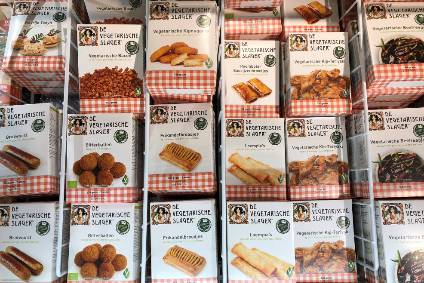
Research just out has revealed that some 40% of food manufacturers and grocers now have dedicated teams for plant-based products.
London-based investor network FAIRR revealed in its Appetite for Disruption: A Second Serving report food manufacturers and the retailers that sell their products are increasingly muscling in on the alternative protein market.

Discover B2B Marketing That Performs
Combine business intelligence and editorial excellence to reach engaged professionals across 36 leading media platforms.
It points to retail giants such as Kroger, Tesco and manufacturers including Nestlé and Unilever having dedicated plant-based teams.
FAIRR’s research reveals venture investments in plant-based proteins have already reached US$1.1bn in 2020, almost double the total investment in 2019, as “Covid-19 leads to a watershed year for plant-based market capitalisation”.
The not-for-profit organisation, which includes UBS Asset Management and Aberdeen Standard Investments amongst its members, found seven of 15 retailers now sell, or plan to sell, plant-based meat alternatives on the meat aisle.
The report said the alternative protein market is expected to grow to $17.9bn by 2025.
Jeremy Coller, founder of FAIRR and chief investment officer at Coller Capital said: “The company data published today is hard evidence that big food brands are vying for their slice of the plant-based pie. They are drastically scaling-up and skilling-up their capacity to research and develop plant-based alternatives to meat and dairy. Tangible goals for a protein transition are being put in place.
“The post-Covid landscape has made 2020 a watershed year for the sustainable protein market: the sector has attracted double the investment of last year in just six months. This engagement shows which food companies are putting in place the infrastructure and innovation to benefit from this seismic shift in the ways we shop and eat; and those that will lose out. Investors are watching closely.”
Hanneke Faber, the president of Unilever’s food and refreshments division, home to brands including The Vegetarian Butcher, as well as vegan products sold under brands like Hellmann’s and Ben & Jerry’s, said: “We are very supportive of the work FAIRR is doing to advocate for increased investment in this area. With half a billion Unilever products consumed every day, we have a responsibility and an opportunity to help transition towards a food system that is more resilient and more sustainable.”

US Tariffs are shifting - will you react or anticipate?
Don’t let policy changes catch you off guard. Stay proactive with real-time data and expert analysis.
By GlobalDataLast month, FAIRR claimed the global animal-protein industry is “vulnerable to zoonotic outbreaks and guilty of creating them”, arguing Covid-19 is “a warning of the role modern animal production systems can play in increasing zoonotic disease risk”.





